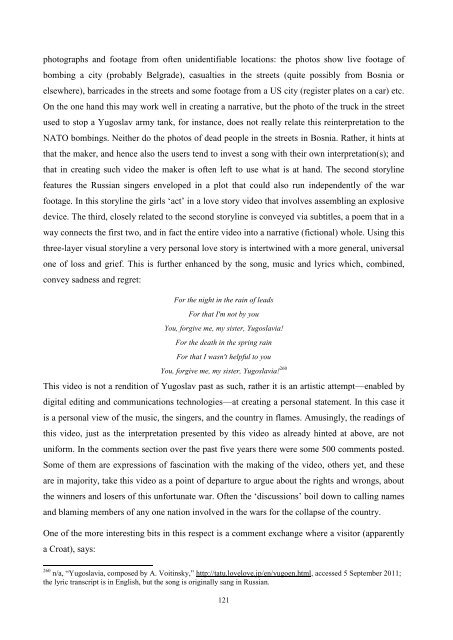UNIVERSITY OF NOVA GORICA GRADUATE SCHOOL ...
UNIVERSITY OF NOVA GORICA GRADUATE SCHOOL ...
UNIVERSITY OF NOVA GORICA GRADUATE SCHOOL ...
You also want an ePaper? Increase the reach of your titles
YUMPU automatically turns print PDFs into web optimized ePapers that Google loves.
photographs and footage from often unidentifiable locations: the photos show live footage of<br />
bombing a city (probably Belgrade), casualties in the streets (quite possibly from Bosnia or<br />
elsewhere), barricades in the streets and some footage from a US city (register plates on a car) etc.<br />
On the one hand this may work well in creating a narrative, but the photo of the truck in the street<br />
used to stop a Yugoslav army tank, for instance, does not really relate this reinterpretation to the<br />
NATO bombings. Neither do the photos of dead people in the streets in Bosnia. Rather, it hints at<br />
that the maker, and hence also the users tend to invest a song with their own interpretation(s); and<br />
that in creating such video the maker is often left to use what is at hand. The second storyline<br />
features the Russian singers enveloped in a plot that could also run independently of the war<br />
footage. In this storyline the girls ‗act‘ in a love story video that involves assembling an explosive<br />
device. The third, closely related to the second storyline is conveyed via subtitles, a poem that in a<br />
way connects the first two, and in fact the entire video into a narrative (fictional) whole. Using this<br />
three-layer visual storyline a very personal love story is intertwined with a more general, universal<br />
one of loss and grief. This is further enhanced by the song, music and lyrics which, combined,<br />
convey sadness and regret:<br />
For the night in the rain of leads<br />
For that I'm not by you<br />
You, forgive me, my sister, Yugoslavia!<br />
For the death in the spring rain<br />
For that I wasn't helpful to you<br />
You, forgive me, my sister, Yugoslavia! 260<br />
This video is not a rendition of Yugoslav past as such, rather it is an artistic attempt—enabled by<br />
digital editing and communications technologies—at creating a personal statement. In this case it<br />
is a personal view of the music, the singers, and the country in flames. Amusingly, the readings of<br />
this video, just as the interpretation presented by this video as already hinted at above, are not<br />
uniform. In the comments section over the past five years there were some 500 comments posted.<br />
Some of them are expressions of fascination with the making of the video, others yet, and these<br />
are in majority, take this video as a point of departure to argue about the rights and wrongs, about<br />
the winners and losers of this unfortunate war. Often the ‗discussions‘ boil down to calling names<br />
and blaming members of any one nation involved in the wars for the collapse of the country.<br />
One of the more interesting bits in this respect is a comment exchange where a visitor (apparently<br />
a Croat), says:<br />
260 n/a, ―Yugoslavia, composed by A. Voitinsky,‖ http://tatu.lovelove.jp/en/yugoen.html, accessed 5 September 2011;<br />
the lyric transcript is in English, but the song is originally sang in Russian.<br />
121

















